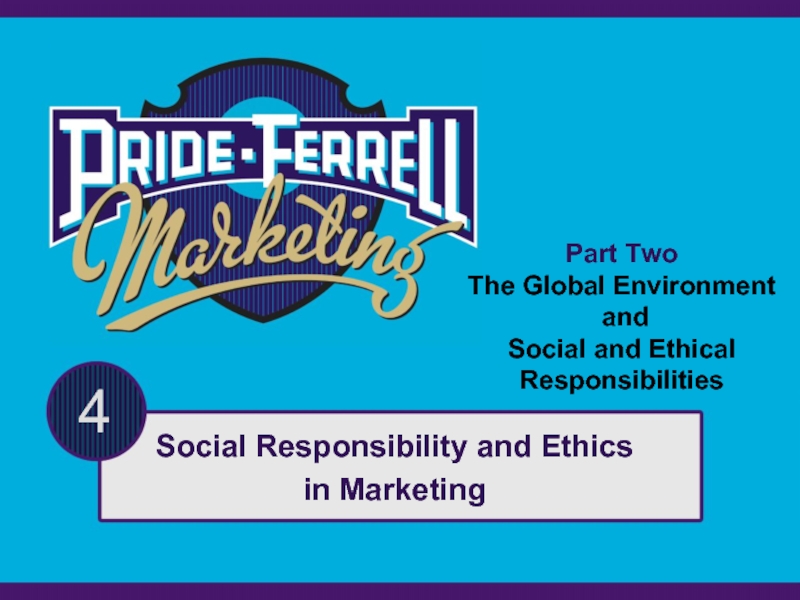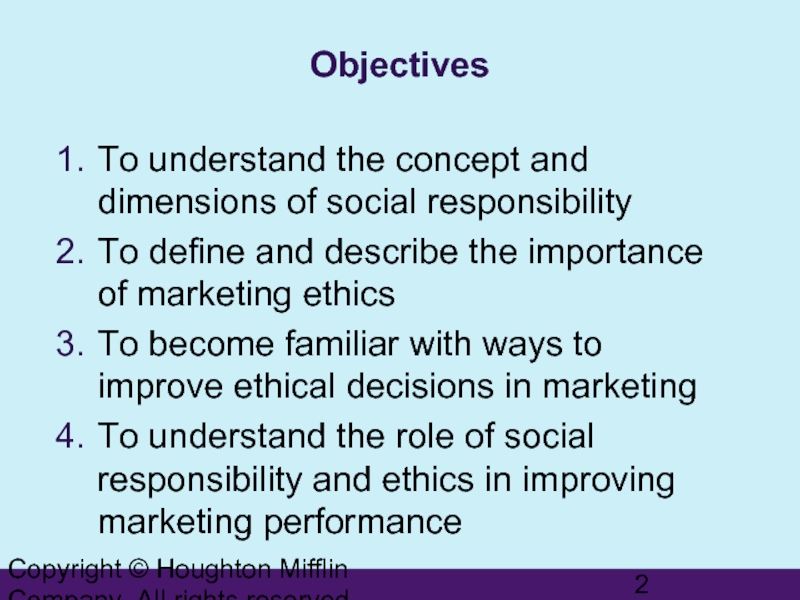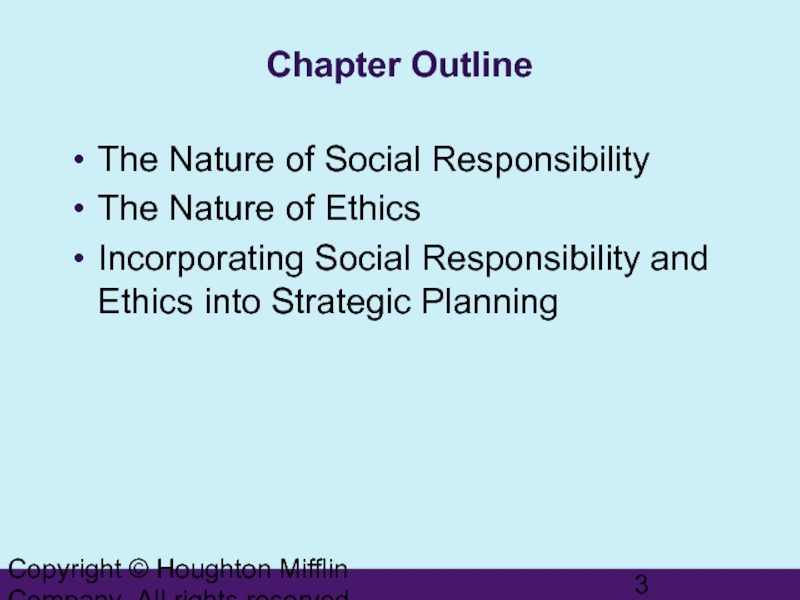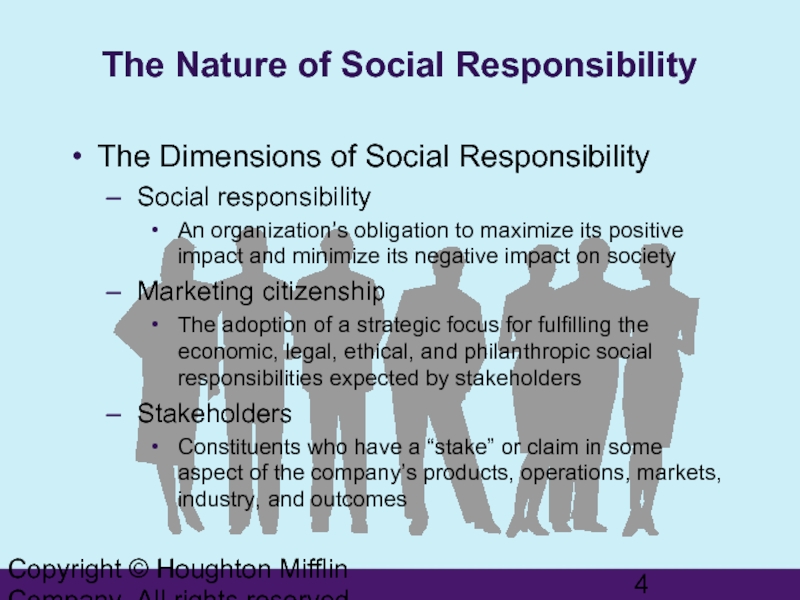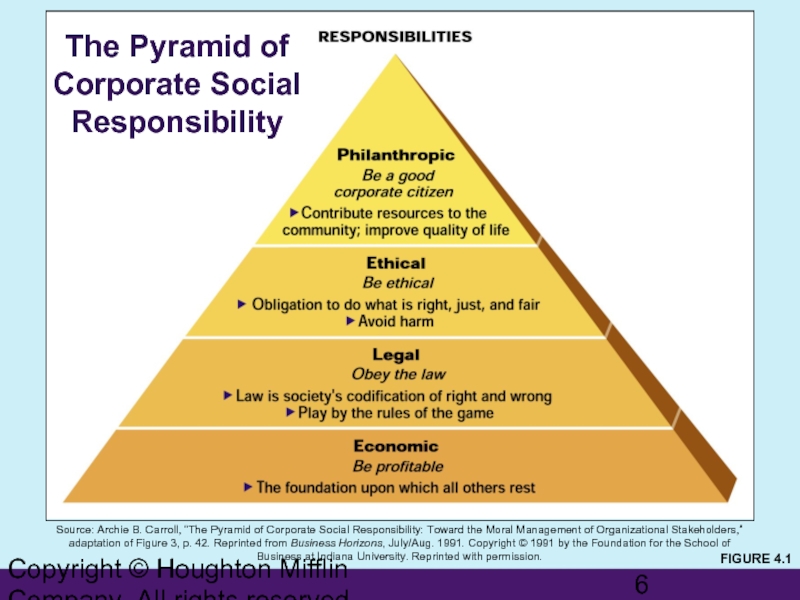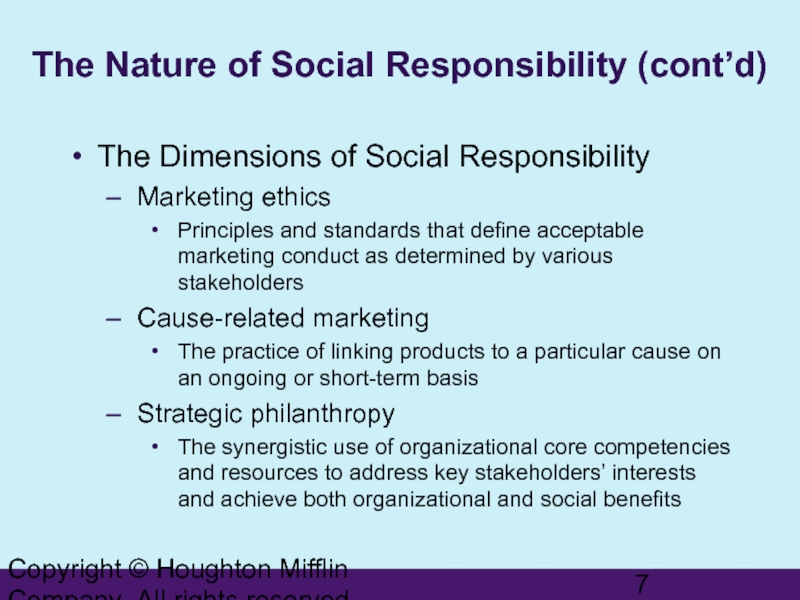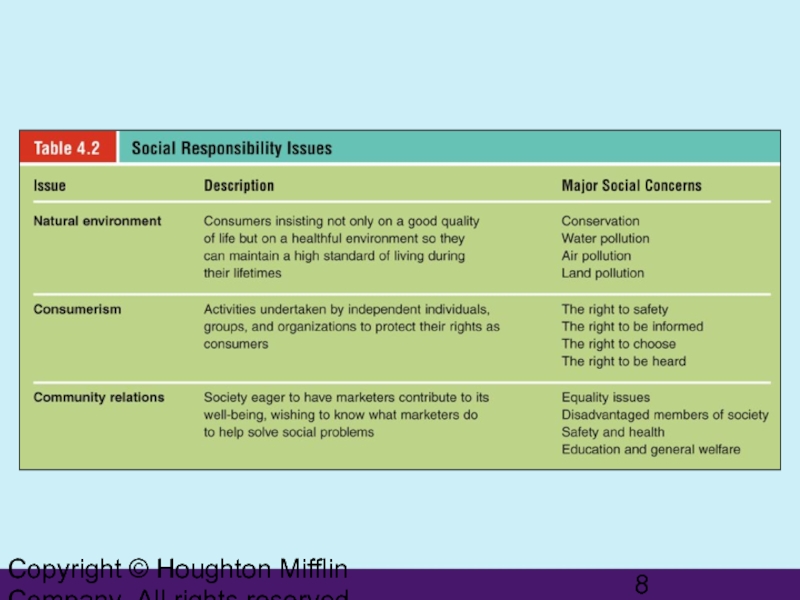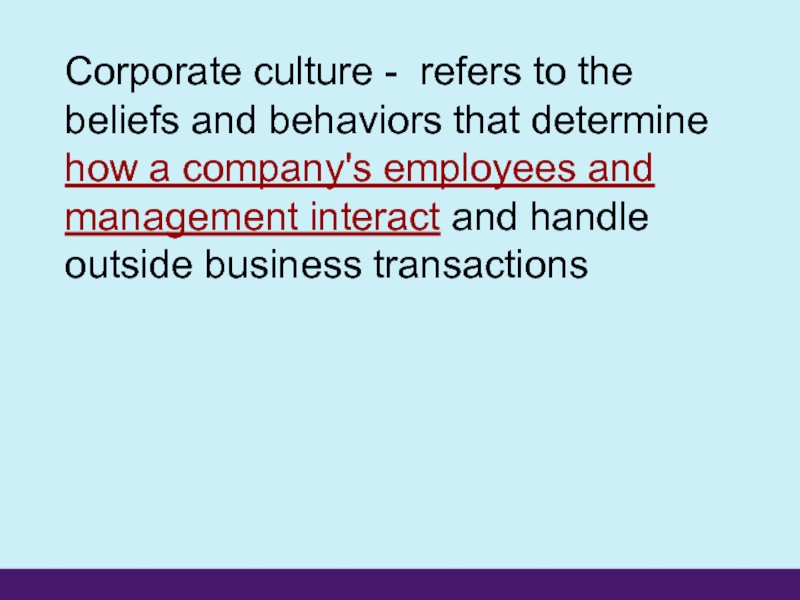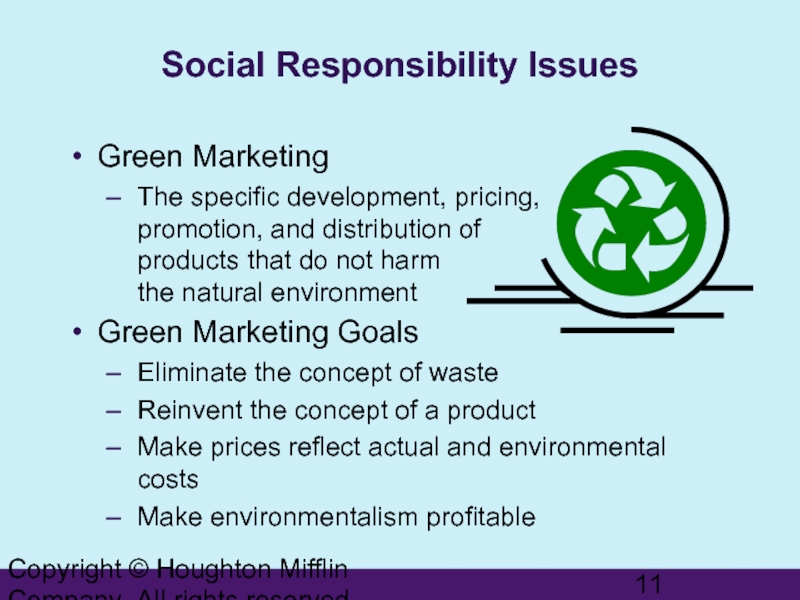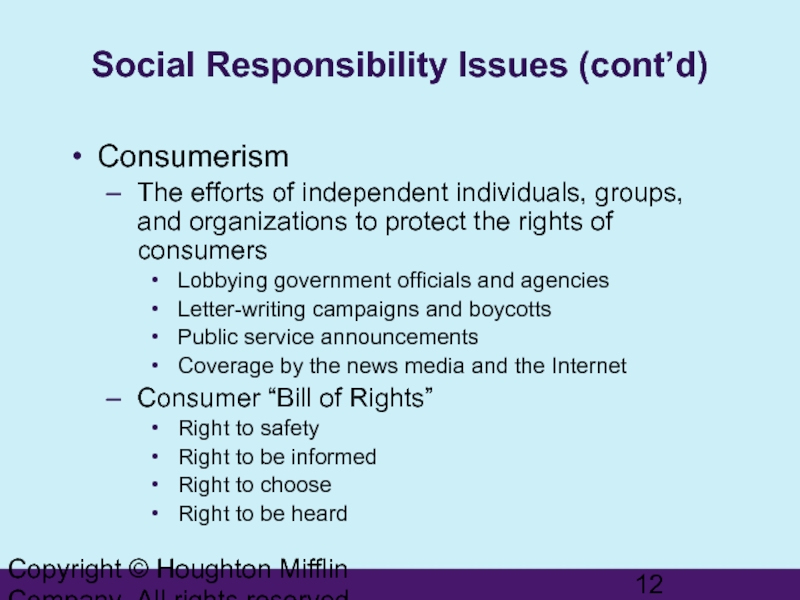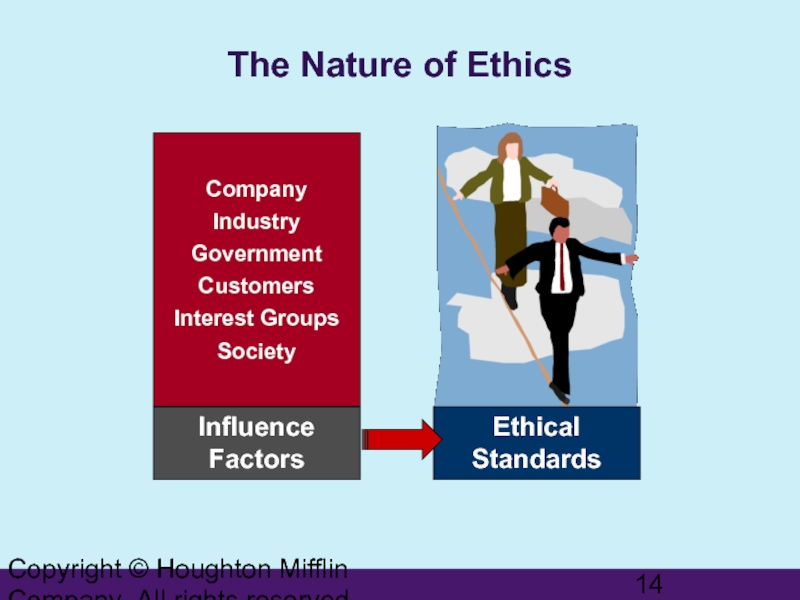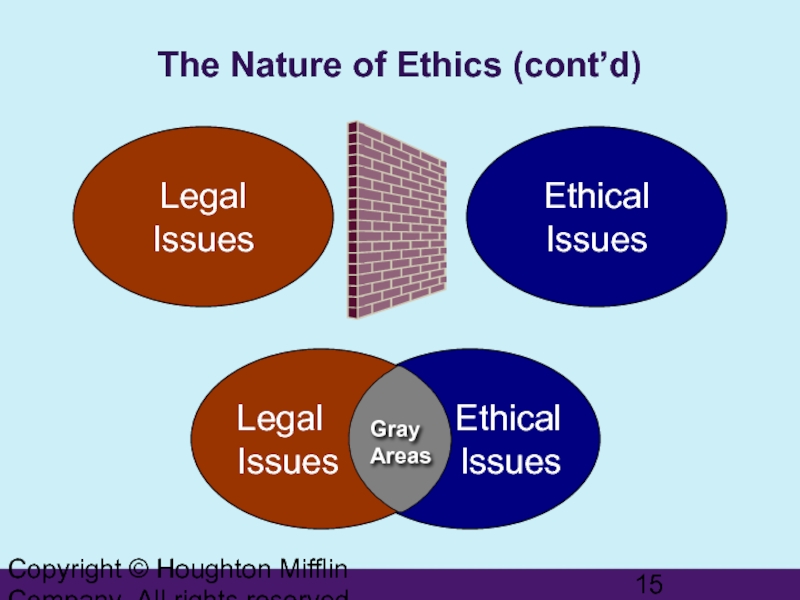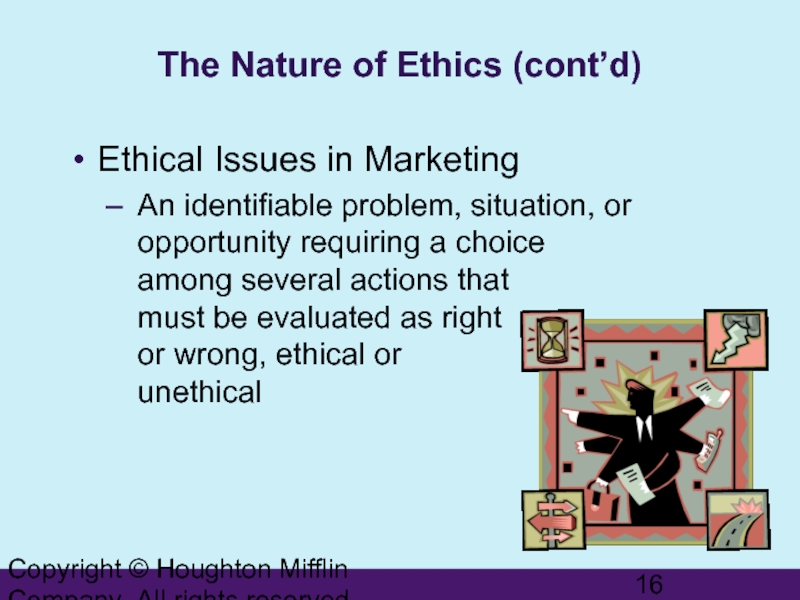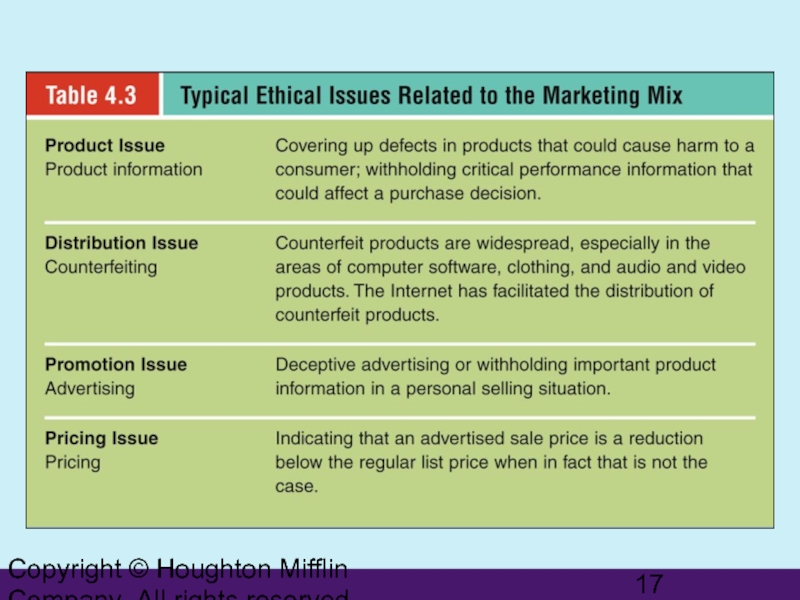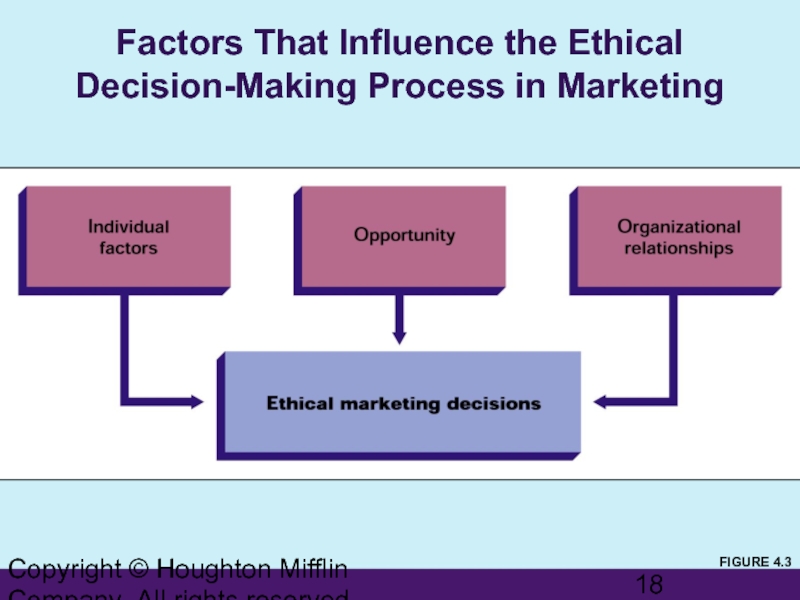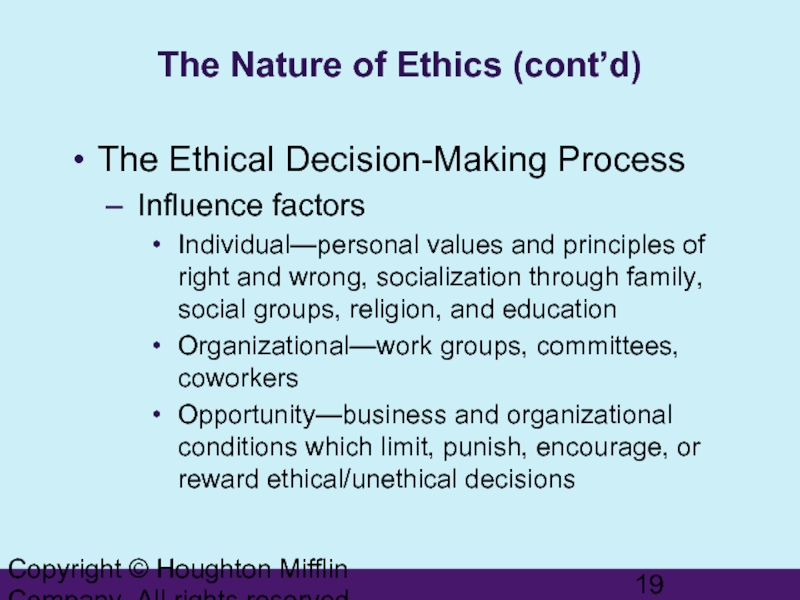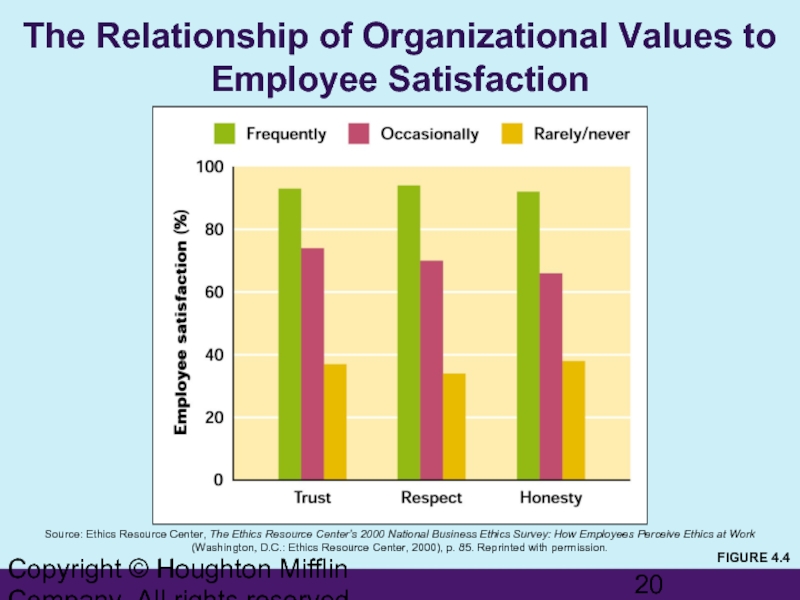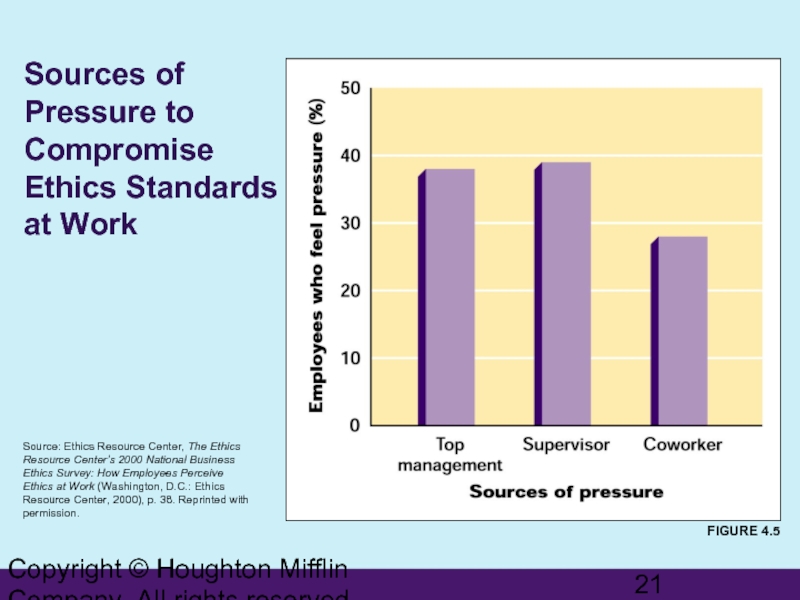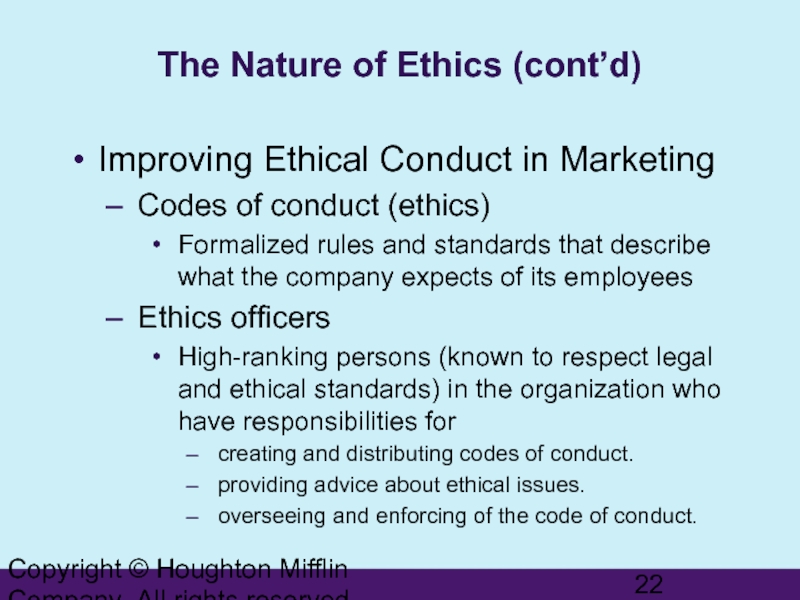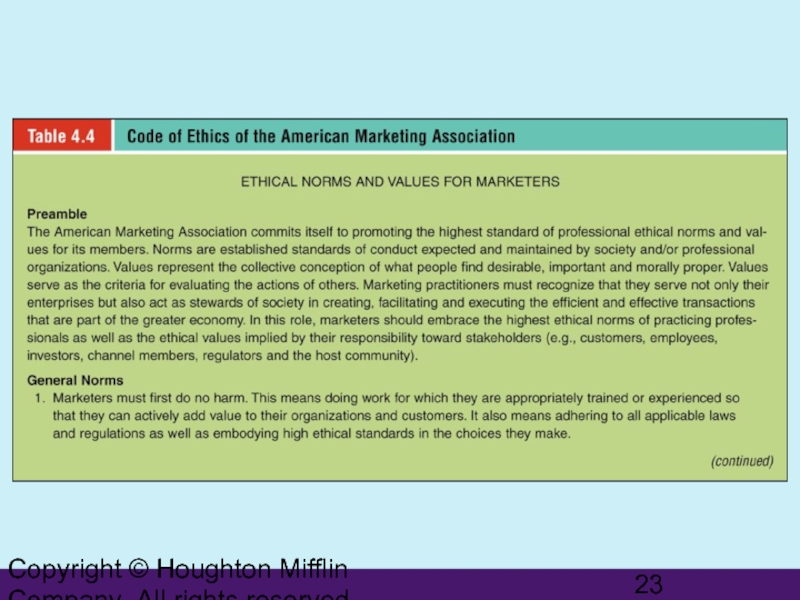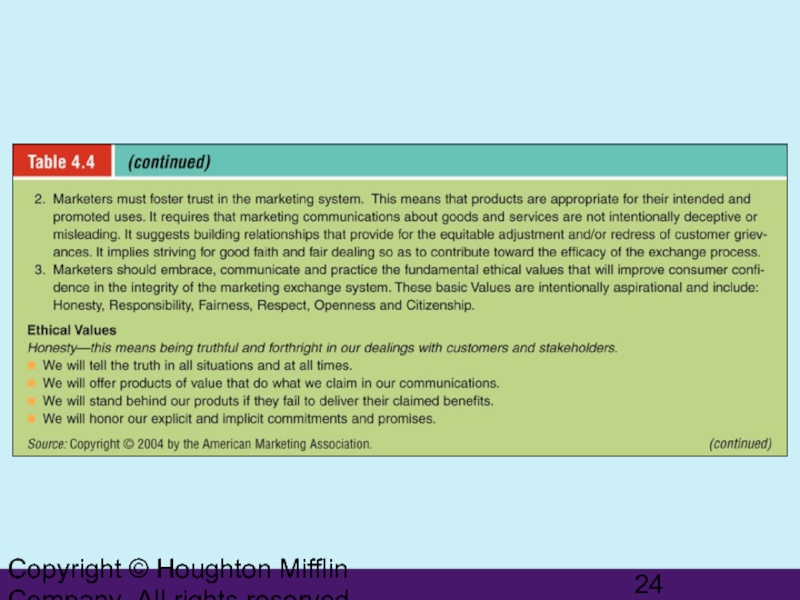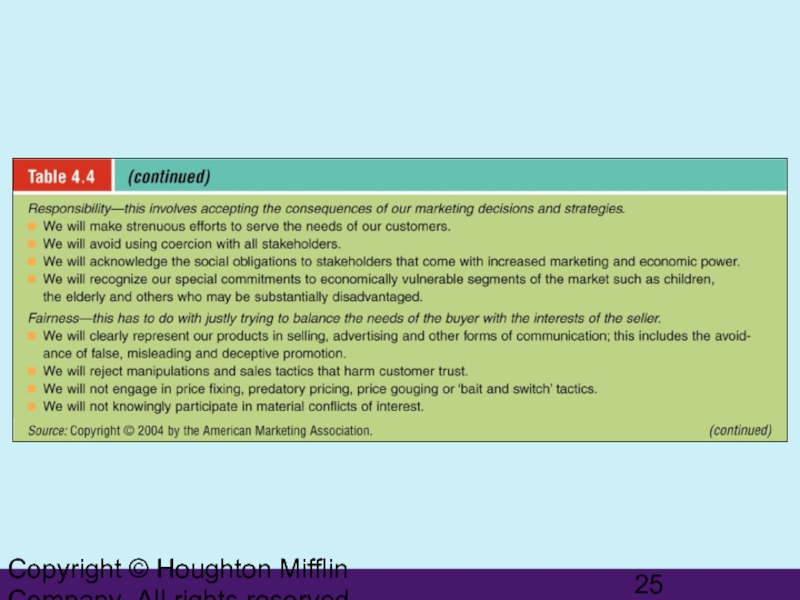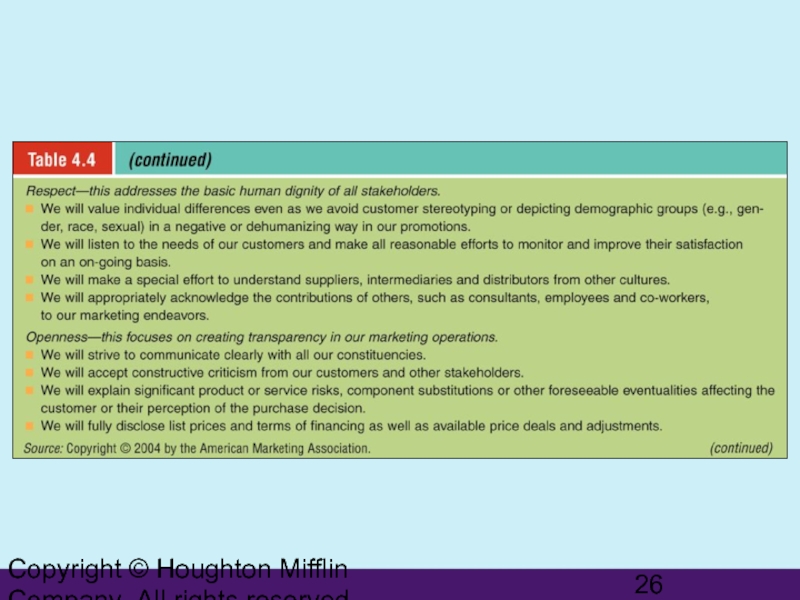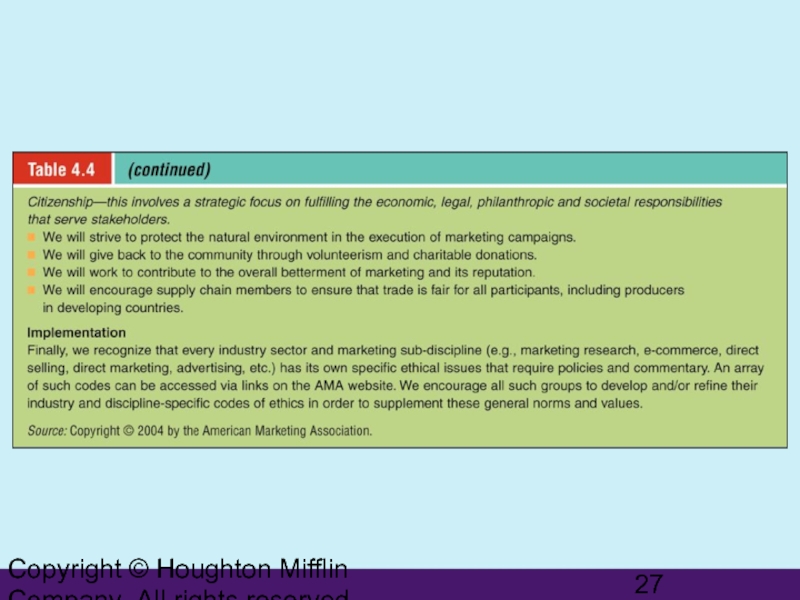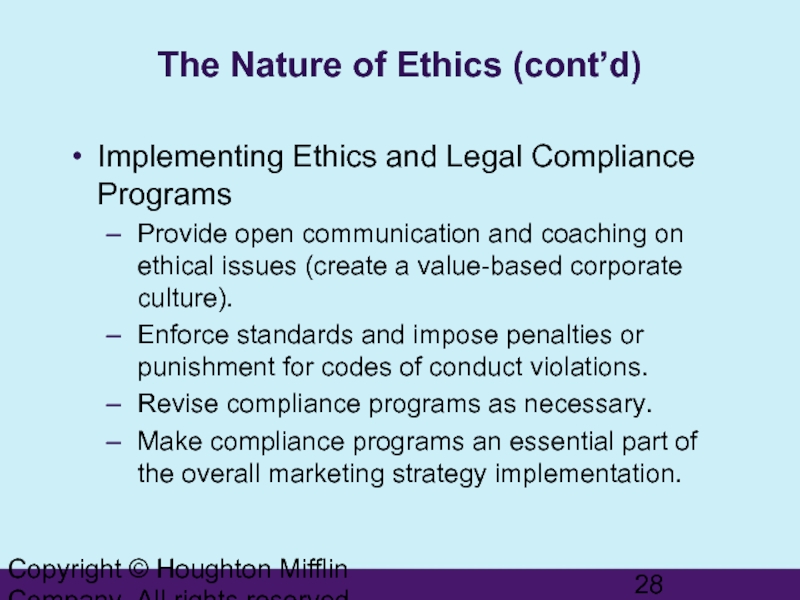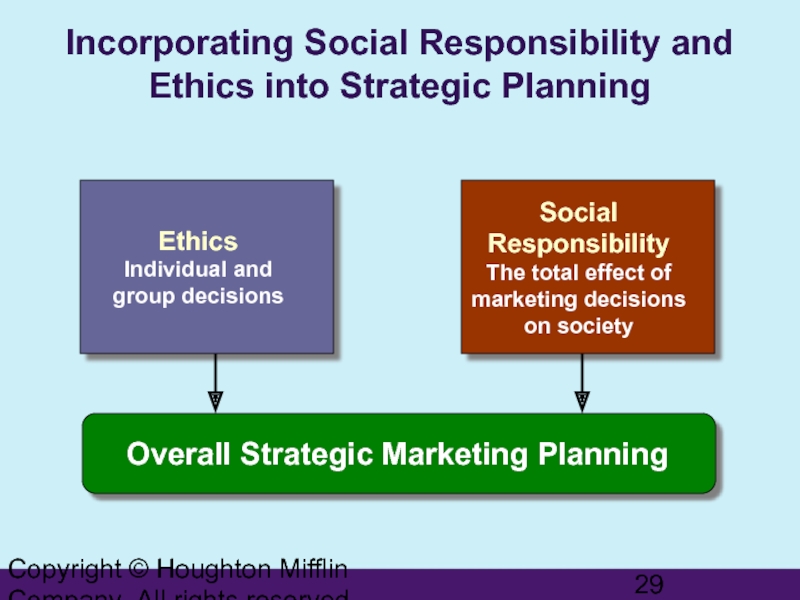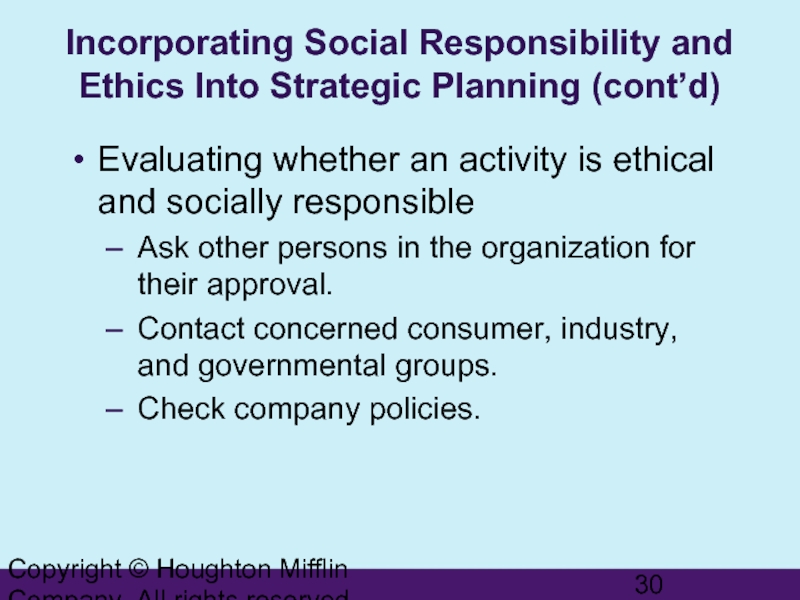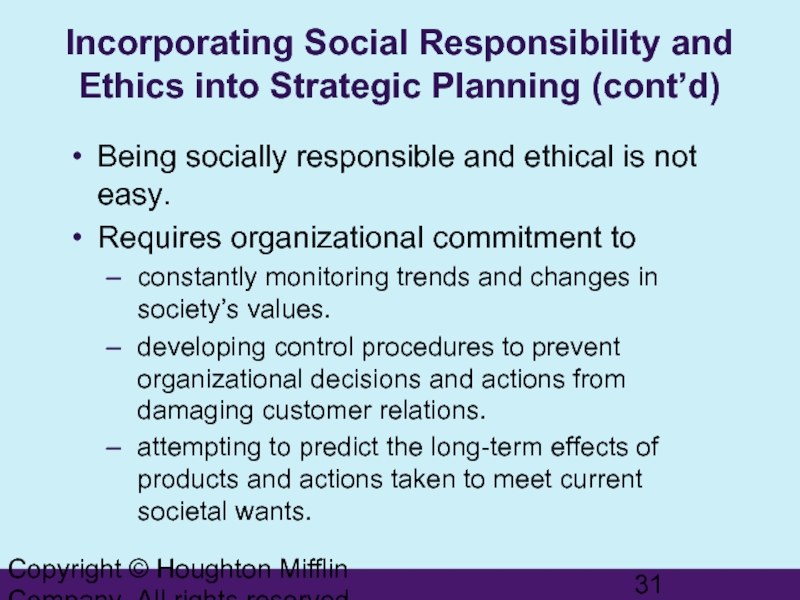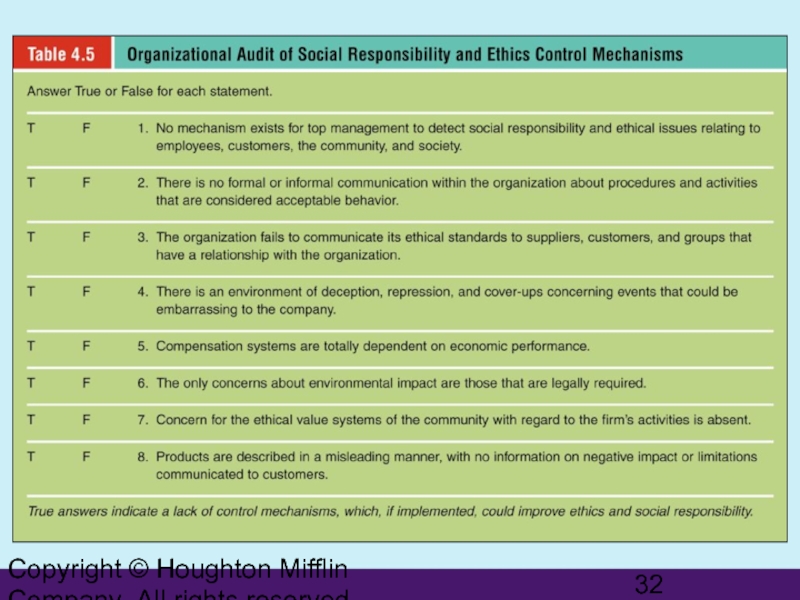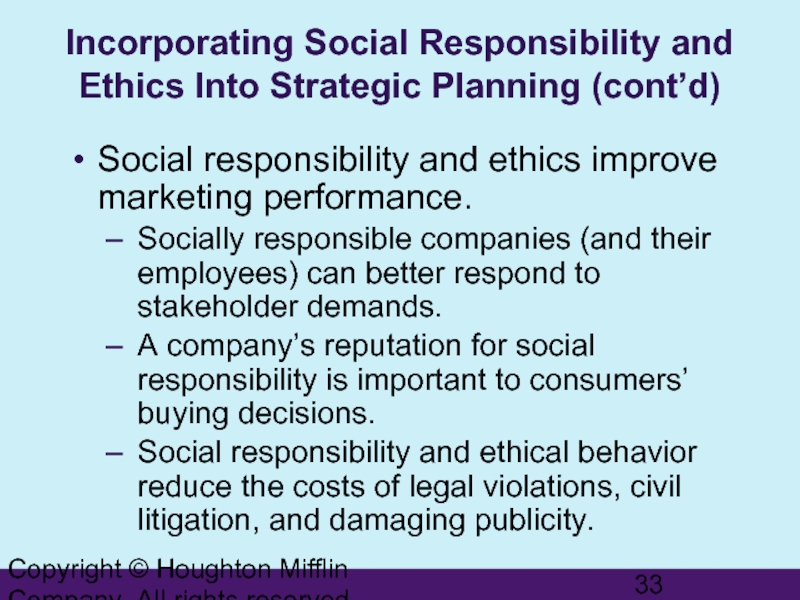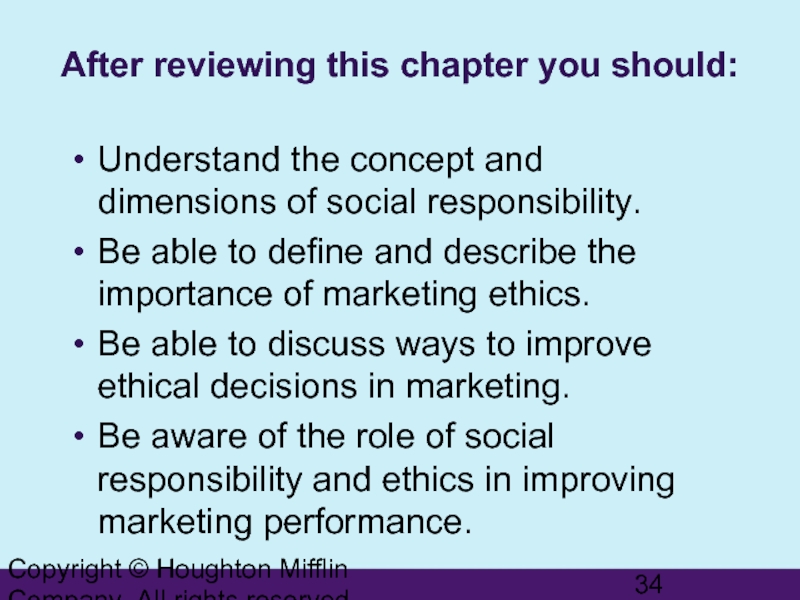- Главная
- Разное
- Дизайн
- Бизнес и предпринимательство
- Аналитика
- Образование
- Развлечения
- Красота и здоровье
- Финансы
- Государство
- Путешествия
- Спорт
- Недвижимость
- Армия
- Графика
- Культурология
- Еда и кулинария
- Лингвистика
- Английский язык
- Астрономия
- Алгебра
- Биология
- География
- Детские презентации
- Информатика
- История
- Литература
- Маркетинг
- Математика
- Медицина
- Менеджмент
- Музыка
- МХК
- Немецкий язык
- ОБЖ
- Обществознание
- Окружающий мир
- Педагогика
- Русский язык
- Технология
- Физика
- Философия
- Химия
- Шаблоны, картинки для презентаций
- Экология
- Экономика
- Юриспруденция
Social responsibility and ethics in marketing презентация
Содержание
- 1. Social responsibility and ethics in marketing
- 2. Copyright © Houghton Mifflin Company. All rights
- 3. Copyright © Houghton Mifflin Company. All rights
- 4. Copyright © Houghton Mifflin Company. All rights
- 5. Copyright © Houghton Mifflin Company. All rights
- 6. Copyright © Houghton Mifflin Company. All rights
- 7. Copyright © Houghton Mifflin Company. All rights
- 8. Copyright © Houghton Mifflin Company. All rights reserved.
- 9. Corporate culture - refers to the beliefs
- 10. Copyright © Houghton Mifflin Company. All rights
- 11. Copyright © Houghton Mifflin Company. All rights
- 12. Copyright © Houghton Mifflin Company. All rights
- 13. Copyright © Houghton Mifflin Company. All rights
- 14. Copyright © Houghton Mifflin Company. All rights reserved. The Nature of Ethics
- 15. Copyright © Houghton Mifflin Company. All rights
- 16. Copyright © Houghton Mifflin Company. All rights
- 17. Copyright © Houghton Mifflin Company. All rights reserved.
- 18. Copyright © Houghton Mifflin Company. All rights
- 19. Copyright © Houghton Mifflin Company. All rights
- 20. Copyright © Houghton Mifflin Company. All rights
- 21. Copyright © Houghton Mifflin Company. All rights
- 22. Copyright © Houghton Mifflin Company. All rights
- 23. Copyright © Houghton Mifflin Company. All rights reserved.
- 24. Copyright © Houghton Mifflin Company. All rights reserved.
- 25. Copyright © Houghton Mifflin Company. All rights reserved.
- 26. Copyright © Houghton Mifflin Company. All rights reserved.
- 27. Copyright © Houghton Mifflin Company. All rights reserved.
- 28. Copyright © Houghton Mifflin Company. All rights
- 29. Copyright © Houghton Mifflin Company. All rights
- 30. Copyright © Houghton Mifflin Company. All rights
- 31. Copyright © Houghton Mifflin Company. All rights
- 32. Copyright © Houghton Mifflin Company. All rights reserved.
- 33. Copyright © Houghton Mifflin Company. All rights
- 34. Copyright © Houghton Mifflin Company. All rights
Слайд 2Copyright © Houghton Mifflin Company. All rights reserved.
Objectives
To understand the concept
To define and describe the importance of marketing ethics
To become familiar with ways to improve ethical decisions in marketing
To understand the role of social responsibility and ethics in improving marketing performance
Слайд 3Copyright © Houghton Mifflin Company. All rights reserved.
Chapter Outline
The Nature of
The Nature of Ethics
Incorporating Social Responsibility and Ethics into Strategic Planning
Слайд 4Copyright © Houghton Mifflin Company. All rights reserved.
The Nature of Social
The Dimensions of Social Responsibility
Social responsibility
An organization’s obligation to maximize its positive impact and minimize its negative impact on society
Marketing citizenship
The adoption of a strategic focus for fulfilling the economic, legal, ethical, and philanthropic social responsibilities expected by stakeholders
Stakeholders
Constituents who have a “stake” or claim in some aspect of the company’s products, operations, markets, industry, and outcomes
Слайд 5Copyright © Houghton Mifflin Company. All rights reserved.
Best Corporate Citizens
Source: Peter
Слайд 6Copyright © Houghton Mifflin Company. All rights reserved.
The Pyramid of Corporate
FIGURE 4.1
Source: Archie B. Carroll, “The Pyramid of Corporate Social Responsibility: Toward the Moral Management of Organizational Stakeholders,” adaptation of Figure 3, p. 42. Reprinted from Business Horizons, July/Aug. 1991. Copyright © 1991 by the Foundation for the School of Business at Indiana University. Reprinted with permission.
Слайд 7Copyright © Houghton Mifflin Company. All rights reserved.
The Nature of Social
The Dimensions of Social Responsibility
Marketing ethics
Principles and standards that define acceptable marketing conduct as determined by various stakeholders
Cause-related marketing
The practice of linking products to a particular cause on an ongoing or short-term basis
Strategic philanthropy
The synergistic use of organizational core competencies and resources to address key stakeholders’ interests and achieve both organizational and social benefits
Слайд 9Corporate culture - refers to the beliefs and behaviors that determine
Слайд 10Copyright © Houghton Mifflin Company. All rights reserved.
The European
Eco-label
FIGURE 4.2
Courtesy
Слайд 11Copyright © Houghton Mifflin Company. All rights reserved.
Social Responsibility Issues
Green Marketing
The
Green Marketing Goals
Eliminate the concept of waste
Reinvent the concept of a product
Make prices reflect actual and environmental costs
Make environmentalism profitable
Слайд 12Copyright © Houghton Mifflin Company. All rights reserved.
Social Responsibility Issues (cont’d)
Consumerism
The
Lobbying government officials and agencies
Letter-writing campaigns and boycotts
Public service announcements
Coverage by the news media and the Internet
Consumer “Bill of Rights”
Right to safety
Right to be informed
Right to choose
Right to be heard
Слайд 13Copyright © Houghton Mifflin Company. All rights reserved.
Social Responsibility Issues (cont’d)
Community
Expectations of firms as “good corporate citizens”
Philanthropic contributions to civic projects and institutions
Educational, health, cultural, and recreational
Employee volunteer participation
Employment opportunities and economic development
Слайд 15Copyright © Houghton Mifflin Company. All rights reserved.
The Nature of Ethics
Gray
Areas
Слайд 16Copyright © Houghton Mifflin Company. All rights reserved.
The Nature of Ethics
Ethical Issues in Marketing
An identifiable problem, situation, or opportunity requiring a choice
among several actions that
must be evaluated as right
or wrong, ethical or
unethical
Слайд 18Copyright © Houghton Mifflin Company. All rights reserved.
Factors That Influence the
FIGURE 4.3
Слайд 19Copyright © Houghton Mifflin Company. All rights reserved.
The Nature of Ethics
The Ethical Decision-Making Process
Influence factors
Individual—personal values and principles of right and wrong, socialization through family, social groups, religion, and education
Organizational—work groups, committees, coworkers
Opportunity—business and organizational conditions which limit, punish, encourage, or reward ethical/unethical decisions
Слайд 20Copyright © Houghton Mifflin Company. All rights reserved.
The Relationship of Organizational
FIGURE 4.4
Source: Ethics Resource Center, The Ethics Resource Center’s 2000 National Business Ethics Survey: How Employees Perceive Ethics at Work (Washington, D.C.: Ethics Resource Center, 2000), p. 85. Reprinted with permission.
Слайд 21Copyright © Houghton Mifflin Company. All rights reserved.
Sources of Pressure to
FIGURE 4.5
Source: Ethics Resource Center, The Ethics Resource Center’s 2000 National Business Ethics Survey: How Employees Perceive Ethics at Work (Washington, D.C.: Ethics Resource Center, 2000), p. 38. Reprinted with permission.
Слайд 22Copyright © Houghton Mifflin Company. All rights reserved.
The Nature of Ethics
Improving Ethical Conduct in Marketing
Codes of conduct (ethics)
Formalized rules and standards that describe what the company expects of its employees
Ethics officers
High-ranking persons (known to respect legal and ethical standards) in the organization who have responsibilities for
creating and distributing codes of conduct.
providing advice about ethical issues.
overseeing and enforcing of the code of conduct.
Слайд 28Copyright © Houghton Mifflin Company. All rights reserved.
The Nature of Ethics
Implementing Ethics and Legal Compliance Programs
Provide open communication and coaching on ethical issues (create a value-based corporate culture).
Enforce standards and impose penalties or punishment for codes of conduct violations.
Revise compliance programs as necessary.
Make compliance programs an essential part of the overall marketing strategy implementation.
Слайд 29Copyright © Houghton Mifflin Company. All rights reserved.
Incorporating Social Responsibility and
Overall Strategic Marketing Planning
Ethics
Individual and
group decisions
Social Responsibility
The total effect of marketing decisions on society
Слайд 30Copyright © Houghton Mifflin Company. All rights reserved.
Incorporating Social Responsibility and
Evaluating whether an activity is ethical and socially responsible
Ask other persons in the organization for their approval.
Contact concerned consumer, industry, and governmental groups.
Check company policies.
Слайд 31Copyright © Houghton Mifflin Company. All rights reserved.
Incorporating Social Responsibility and
Being socially responsible and ethical is not easy.
Requires organizational commitment to
constantly monitoring trends and changes in society’s values.
developing control procedures to prevent organizational decisions and actions from damaging customer relations.
attempting to predict the long-term effects of products and actions taken to meet current societal wants.
Слайд 33Copyright © Houghton Mifflin Company. All rights reserved.
Incorporating Social Responsibility and
Social responsibility and ethics improve marketing performance.
Socially responsible companies (and their employees) can better respond to stakeholder demands.
A company’s reputation for social responsibility is important to consumers’ buying decisions.
Social responsibility and ethical behavior reduce the costs of legal violations, civil litigation, and damaging publicity.
Слайд 34Copyright © Houghton Mifflin Company. All rights reserved.
After reviewing this chapter
Understand the concept and dimensions of social responsibility.
Be able to define and describe the importance of marketing ethics.
Be able to discuss ways to improve ethical decisions in marketing.
Be aware of the role of social responsibility and ethics in improving marketing performance.
